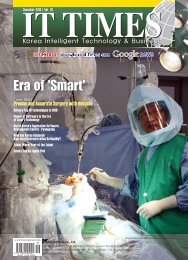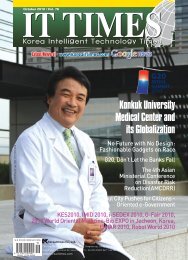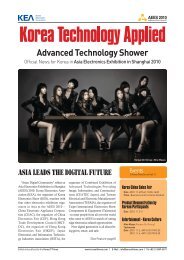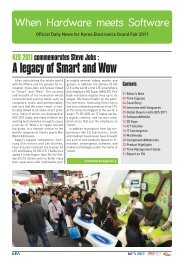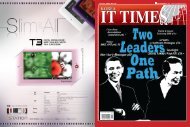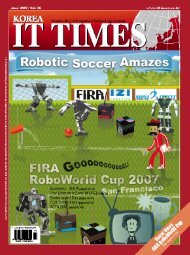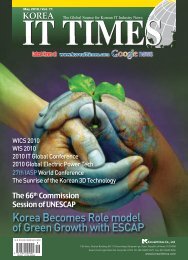Konkuk University Medical Center and its ... - Korea IT Times
Konkuk University Medical Center and its ... - Korea IT Times
Konkuk University Medical Center and its ... - Korea IT Times
You also want an ePaper? Increase the reach of your titles
YUMPU automatically turns print PDFs into web optimized ePapers that Google loves.
Column<br />
E-learning progress<br />
Electronically supported learning comes in many forms. A<br />
wide variety of educators <strong>and</strong> schools use a broad range of tools<br />
to enhance the classroom experience <strong>and</strong> education as a whole.<br />
Here, this reporter will introduce three programs in which are<br />
widely used in educational institutions around the globe.<br />
• Wikispaces: A wiki is a page or collection of Web pages, enabling<br />
anyone to contribute or modify content on the Internet. In other<br />
words, a wiki is a virtual content management program where<br />
anyone accessing the content can upload <strong>and</strong> exchange a range of<br />
documents, files <strong>and</strong> videos. Adam Frey, one of the founders of<br />
Wikispaces (a type of Wiki platform) highlights the educational value<br />
of Wikispaces, "It's great for schools obviously as there are<br />
endless groups in school, classrooms, clubs, study teams, faculty<br />
groups, etc who need simple ways to work together. Anyone in the<br />
organization can use Wikisapces to do their work in a connected<br />
way.<br />
• Edline: Edline, a Learning Manage-ment System (LMS) is used in<br />
all 50 U.S. states <strong>and</strong> in over 70 countries globally. Its purpose? It's<br />
pretty straightforward: instructors can upload tests, projects, assignment,<br />
class syllabus, <strong>and</strong> progress reports. Edline is an important<br />
tool in promoting parental involvement, supporting teachers,<br />
<strong>and</strong> engaging the learning community.<br />
• Blackboard Learning System: Blackboard is a virtual learning environment.<br />
Its purposes are to add online elements to courses traditionally<br />
taught in a traditional classroom setting <strong>and</strong> to develop<br />
completely online courses. It has become a helpful tool in delivering<br />
learning content, engaging learners, <strong>and</strong> measuring their performance.<br />
(Grade Quick included)<br />
The Taft's teachers are able to insure that every voice is heard <strong>and</strong> that every<br />
perspective is valued <strong>and</strong> respected.<br />
To e- or not to e-<br />
Despite the rapidly developing technology in the arena of E-<br />
Learning, prestigious schools in America continue to hold traditional<br />
learning methods in high regard. For these schools, traditional<br />
methods of education are believed to be a better way to promote<br />
the true meaning of "open education" where the atmosphere<br />
encourages the students to "interact" with the teachers. The<br />
Taft School, a leading national coeducational boarding school in<br />
Watertown, Connecticut has not adapted any of the e-learning<br />
systems described above. Mr. Macmullen, the headmaster of Taft<br />
stated, "Schools just cannot assume the benef<strong>its</strong> of technology.<br />
The application of technology, at all costs, must accelerate learning.<br />
Schools must use technology in a visionary <strong>and</strong> strategic approach<br />
to school campus." Macmullen further states, "At an institution<br />
like Taft, one is given a certain amount of independence.<br />
There is no need for programs such as Edline, because it should<br />
be left as the students' responsibility to actively ask teachers to<br />
evaluate their performance." There are, of course, fervent advocates<br />
of technologically-based learning in classrooms. Most notable<br />
is the <strong>Korea</strong> International School, a co-educational international<br />
school located in Gyeonggi Province. KIS has already implemented<br />
a one-to-one laptop program, which "represents the ultimate<br />
in technology infusion." The school sees the "introduction<br />
of [such] program as a paradigm shift in how instruction is delivered."<br />
Not surprisingly, KIS makes full use of Edline <strong>and</strong> arranges<br />
frequent parent-teacher conferences in virtual space based on daily<br />
reports of students' performance on homework assignments,<br />
projects, tests, <strong>and</strong> grades. Learning Management System, however,<br />
is placing a greater responsibility on the teachers to serve the<br />
students as, in effect, a perfect "secretary". The thinking is that future<br />
generation students won't be responsible for keeping a record<br />
of assignments in a homework log because they will be typed<br />
neatly for them on Wikispaces. Parents won't ever have to ask<br />
their children about the current status of their grades because they<br />
will be able to log onto Edline <strong>and</strong> check for themselves when<br />
ever they like. With a smart phone, parents can immediately send<br />
an e mail or text message to their child's teacher at the moment<br />
when a question arises. Therefore, ubiquitous education cannot<br />
be achieved without ubiquitous teachers. So to what degree<br />
should a government consider development of e-Education?<br />
Students in Wonderl<strong>and</strong><br />
Having a 3D image of an oak tree on page 3 of a digital biology<br />
textbook, would this be a distraction or a great visual aid for students?Performing<br />
a virtual dissection on a pig through simulation<br />
software, would this eco-friendly, not to mention animal-friendly,<br />
solution be better for students in terms of education <strong>its</strong>elf? Many<br />
wondering voices of parents have been shared at the site of e-<br />
Learning Week. As opposed to applying advanced technology to<br />
educational fields, government should set a clear purpose for e-<br />
Learning. As the ultimate goal of e-Government is to encourage<br />
citizen participation in problem solving, the question of to what<br />
extent are we going to allow the merge of technology in education<br />
must be examined, in order to establish effective guidelines.<br />
Andrew Yoo / infor@koreaittimes.com<br />
www.koreaittimes.com 91



